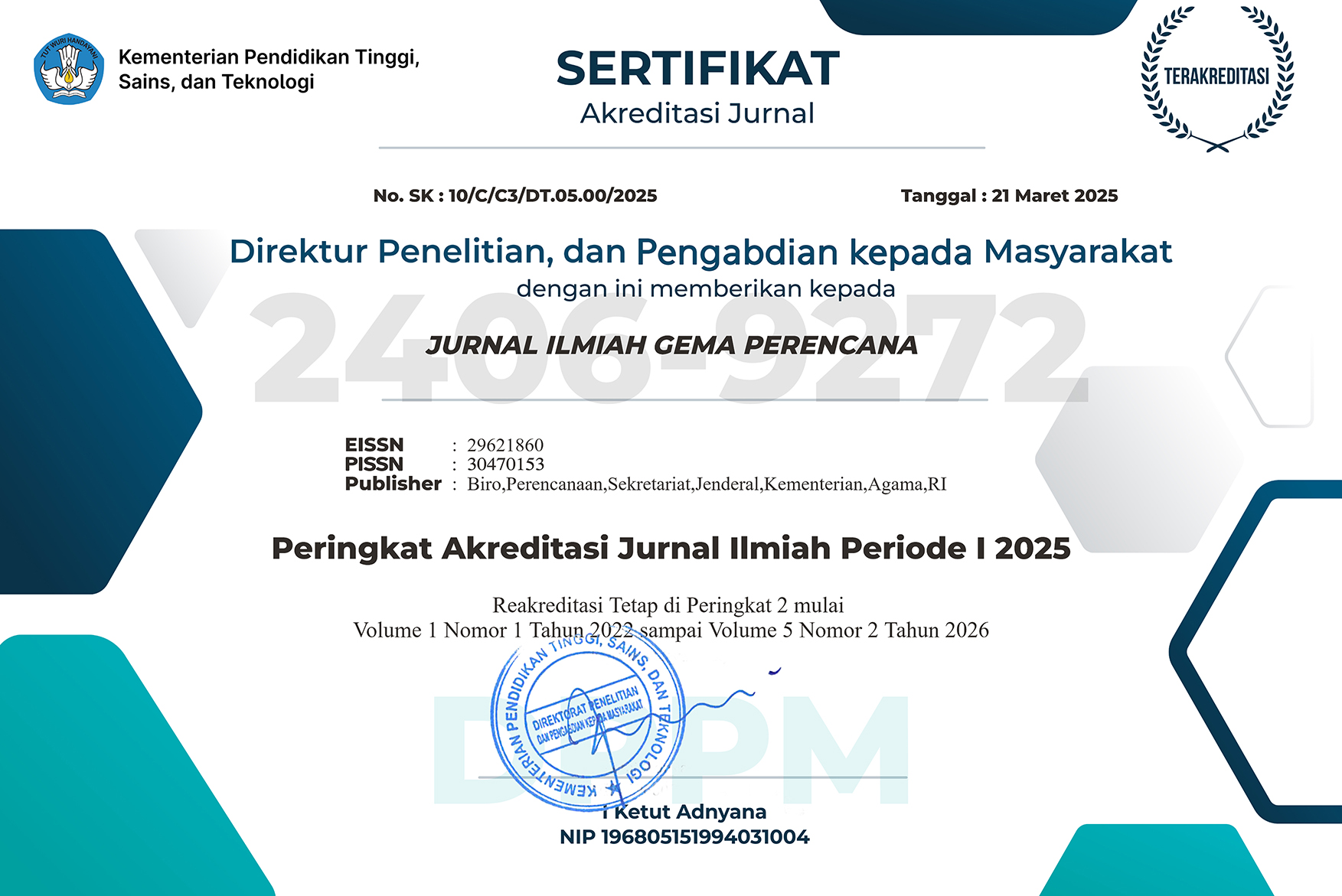Reinforcing the Governance of Religious Moderation Policy: Addressing Structural, Participatory, and Strategic Implementation Challenges
DOI:
https://doi.org/10.61860/jigp.v4i1.239Abstract
This article aims to analyze the effectiveness of the implementation of the Kampung Moderasi Beragama (KMB) Program initiated by the Indonesian Ministry of Religious Affairs to mainstream the values of tolerance, balance, and harmony in religious life. The study employs a descriptive-qualitative approach supported by quantitative data and field interviews in North Maluku Province, using the theoretical framework of policy implementation by Mazmanian and Sabatier, as well as Arnstein’s Ladder of Citizen Participation. The findings reveal several critical challenges, including low public understanding of religious moderation, weak stakeholder coordination, limited community involvement, and insufficient budgetary support. Furthermore, the existence of dual programs—KMB managed by the Directorate General of Islamic Community Guidance and the Desa Sadar Kerukunan (DSK) run by the Center for Religious Harmony—creates overlapping authorities and confusion among local implementers. This article recommends merging both programs into a single, inclusive initiative under the coordination of the Center for Religious Harmony (PKUB), involving multi-faith religious counselors at the grassroots level. Reforming the monitoring and evaluation system, expanding public literacy on religious moderation, and shifting to a collaborative approach are crucial prerequisites for enhancing the effectiveness, efficiency, and sustainability of the program.
Downloads
References
Arnstein, S. R. (1969). A Ladder Of Citizen Participation. Journal of the American Institute of Planners, 35(4), 216–224. https://doi.org/10.1080/01944366908977225
Bormasa, M. F. (2021). Implementasi Program Nasional Pemberdayaan Masyarakat Mandiri Pedesaan (PNPM-MP) di Desa Harapan Kecamatan Malili Kanbupaten Luwu Timur. https://doi.org/10.31237/osf.io/xsu6b
Derung, T. N., Resi, H., & X, I. P. (2023). Toleransi dalam bingkai moderasi beragama: Sebuah studi kasus pada kampung moderasi di Malang Selatan. KURIOS, 9(1), 52. https://doi.org/10.30995/kur.v9i1.723
Hasan, I. (2022). Program Penguatan Moderasi Beragama Menuju Indonesia yang Rukun, Damai dan Toleran di Lingkungan Kementerian Agama Kota Mojokerto. JURNAL ILMIAH GEMA PERENCANA, 1(2). https://doi.org/10.61860/jigp.v1i2.10
Junaedi, E. (2022). MOderasi Beragama dalam Tinjauan Kritis Kebebasan Beragama. Harmoni, 21(2), 330–339. https://doi.org/10.32488/harmoni.v21i2.641
Kemenag. (2023). Kemenag Luncurkan Program 1.000 Kampung Moderasi Beragama. Kementerian Agama. https://kemenag.go.id/nasional/kemenag-luncurkan-program-1-000-kampung-moderasi-beragama-uE6vi
Masykur, F. (2024). Problematika Program Penguatan Moderasi Beragama di Indonesia dan Tawaran Solusinya. AL Fikrah : Jurnal Pendidikan Dan Pemikiran Islam, 4(1), 93–102. https://doi.org/10.51476/alfikrah.v4i1.628
Mazmanian, D. A., & Sabatier, P. A. (1983). Implementation and Public Policy. IL: Scott, Foresman.
Mukhibat, M., Effendi, M., Setyawan, W. H., & Sutoyo, M. (2024). Development and evaluation of religious moderation education curriculum at higher education in Indonesia. Cogent Education, 11(1). https://doi.org/10.1080/2331186X.2024.2302308
Nada, A. L. I., Arifin, A. S., Anggraini, T. M., & Sultoni, A. (2024). Program Kampung Tepa Salira Sebagai Upaya Penguatan Toleransi dan Moderasi Beragama Masyarakat Multikultural Kelurahan Tlogomas, Kota Malang. JURPIKAT (Jurnal Pengabdian Kepada Masyarakat), 5(1), 109–119. https://doi.org/10.37339/jurpikat.v5i1.1531
Putrawan, A. D., & Gafur, A. (2021). Moderasi Beragama Berbasis Komunitas. Sophist : Jurnal Sosial Politik Kajian Islam Dan Tafsir, 3(2), 1–18. https://doi.org/10.20414/sophist.v3i2.44
Rianto, F., Nengsih, N. S., & Setyadiharja, R. (2019). Evaluasi Program Kampung Keluarga Berencana di Kota Tanjung Pinang. JURNAL DIMENSI, 8(2). https://doi.org/10.33373/dms.v8i2.2158
Rosenbaum, A. (2002). Public Administration and Democratic Governance: Governments Serving Citizens. United Nation.
Saetren, H. (2005). Facts and Myths about Research on Public Policy Implementation: Out‐of‐Fashion, Allegedly Dead, But Still Very Much Alive and Relevant. Policy Studies Journal, 33(4), 559–582. https://doi.org/10.1111/j.1541-0072.2005.00133.x
Santoso, A. G., ’Aina, M. Q., Maknun, M. L., Muzayanah, U., & Noviani, N. L. (2024). Pengukuran Sikap dan Pemahaman Moderasi Beragama Penyuluh dan Guru. Dialog, 47(2), 187–200. https://doi.org/10.47655/dialog.v47i2.989
Sufratman, S. (2022). Relevansi Moderasi Beragama di Tengah Masyarakat Majemuk. Jurnal Keislaman, 5(2), 206–217. https://doi.org/10.54298/jk.v5i2.3451
Sumarto, S. (2021). Implementasi Program Moderasi Beragama Kementerian Agama RI. Jurnal Pendidikan Guru, 3(1). https://doi.org/10.47783/jurpendigu.v3i1.294
Syukur, Y. (2024). Strengthening Islamic Moderation in Indonesia. Jurnal Pendidikan Islam, 2(2). https://doi.org/10.47134/pjpi.v2i2.1163
Widianingsing, I., & Morell, E. (2007). Participatory Planning in Indonesia: Seeking a New Path to Reform. Policy Studies Journal, 28(1), 1–15. https://doi.org/https://doi.org/10.1080/01442870601121340
Zall Kusek, J., & Rist, R. (2004). Ten Steps to a Results-Based Monitoring and Evaluation System. The World Bank. https://doi.org/10.1596/0-8213-5823-5
Downloads
Published
How to Cite
Issue
Section
License
Copyright (c) 2025 Zakiah

This work is licensed under a Creative Commons Attribution 4.0 International License.








